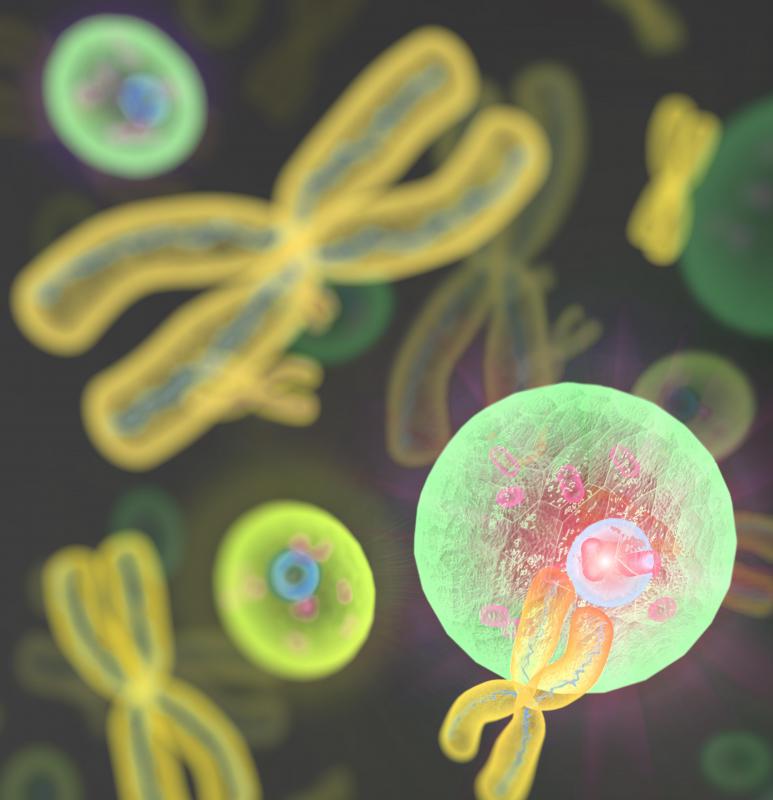At WiseGEEK, we're committed to delivering accurate, trustworthy information. Our expert-authored content is rigorously fact-checked and sourced from credible authorities. Discover how we uphold the highest standards in providing you with reliable knowledge.
What is Chromosome Analysis?
Chromosome analysis is the scientific examination of genetic material. Comprised of proteins and DNA, human chromosomes provide extensive information about the genetic makeup of individuals. As human understanding of genetics has expanded, careful study and interpretation of chromosome composition has become a vital medical tool. Chromosome analysis can show the presence of genetic abnormalities, and may serve as a road map to potential genetic conditions in both the individual and blood-related family members.
Most humans have 46 chromosomes, 23 from each genetic parent. These are contained in the nuclei of cells throughout the body, and samples for analysis can be harvested from the blood, bone marrow or bodily tissues. Samples are treated over several days to cause chromosomes to expand for easier examination. Analysis typically involves 15-20 samples from one patient, in order to ensure that results are redundant as far as possible. Results are typically interpreted by a doctor or geneticist, in order to properly explain the discovered information to patients.

Chromosome abnormalities can occur for several reasons. As genetic material passes from one generation to the next, chromosomes may accidentally rearrange, making it more difficult for cells to divide equally and sometimes causing reproductive problems. People can also have extra or missing chromosomes, which can lead to a variety of health conditions. Down syndrome was one of the first conditions known to be related to the presence of an extra chromosome. In that case, patients with Down syndrome usually feature a second copy of a chromosome known as “21.”

Animal chromosome analysis began in the early 19th century, but human chromosome analysis went largely unexplored until the 20th century. Since the 1950s, huge advances in the understanding of human genetics have been made by dozens of scientists in different fields of study. Less than a century after human chromosomes were first studied for clues to genetic conditions, the practice of chromosome analysis has become a common way to gather medical information about an individual’s genetic code.

Often, chromosome analysis is performed to determine if a family has a genetic predisposition for certain diseases and health conditions. Some people planning to become parents undergo analysis to determine if future children might be at risk for disabilities or illnesses due to a dormant genetic abnormality. Often, the appearance of an abnormality does not guarantee that conditions will ever develop or genetically pass to offspring. It is important to consult with doctors who have expertise in genetics, in order to accurately interpret analysis results.
AS FEATURED ON:
AS FEATURED ON:

















Discussion Comments
@SailorJerry - Yes, amnio includes a chromosome analysis or karyotyping. That's how they can tell if the right chromosomes are present and not too many. I don't blame you for waiting - while it is more accurate than ultrasound, it's not usually done that much earlier.
A friend of mine had CVS (chorionic villi sampling, I think) which can be done as early as 12 weeks. It also includes a chromosome analysis but there is more risk. Not only could you miscarry, there is a chance of limb abnormalities in the baby. (Fortunately, everything was fine for her. She had had not-good results from the nuchal translucency test and wanted immediate reassurance.)
An advantage of amnio over CVS is that while both will detect chromosomal abnormalities, that's about the limit of CVS. Amnio tests the amniotic fluid and so it can also detect neural tube defects like spina bifida (because in that case, spinal fluid will be leaking into the amniotic fluid) and certain infections.
It's never an easy choice. Sounds like you and your wife did what was best for you and I'm glad for your healthy baby!
Is amniocentesis basically a special type of chromosome analysis test? (Or maybe not even that special.) My wife and I considered having one based on some non-ideal results from her blood tests during pregnancy, but we decided to hold off and just have an anatomy scan at 20 weeks. (Everything looked good at that point.)
I know they told us it would take a while to get the results, like it mentions here, and that it would detect chromosomal abnormalities like Downs and the other trisomies and some other stuff as well.
Post your comments